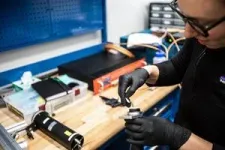(Press-News.org) Through a multi-university collaboration, researchers at Virginia Tech have discovered a new, solid lubricating mechanism that can reduce friction in machinery at extremely high temperatures. It works well beyond the breakdown temperature of traditional solid lubricants such as graphite, and the findings were published in Nature Communications.
“This breakthrough solid-state lubricant could change how we design materials for high-tech engines, making them last longer and work better under extreme conditions,” said Rebecca Cai, associate professor in the Department of Materials Science and Engineering and one of the authors of the study. “After decades of research, only about 20 solid lubricants have been identified.”
The right lubricant could extend a jet engine’s life, saving millions of dollars, but most of those 20 lubricants break down when machinery reaches temperatures as hot as molten lava. The discovery is important because friction and wear were estimated to cost the U.S. economy over $1 trillion in 2023, equivalent to about 5 percent of the gross national product.
Given the importance of materials in emerging areas like advanced manufacturing, these findings position Virginia Tech as a leader in innovative technologies and cutting-edge research with opportunities for transdisciplinary problem-solving.
The research at a glance
Publication: Nature Communications
Title: Spinel Oxide Enables High-Temperature Self-Lubrication in Superalloys
Funding sources: National Science Foundation, Institute for Critical Technology and Applied Sciences
Virginia Tech collaborators
Zhengyu Zhang, then-Ph.D. student in materials science engineering and first author of the study
Wenbo Wang, Ziming Xin, and Wenjun Cai, materials science engineering
Zhifei Deng and Ling Li, mechanical engineering
Liping Liu and Hongliang Xin, chemical engineering
Jing Zhao and Lowell Moore, geosciences
University partners
University of Florida
Arizona State University
University of Nebraska-Lincoln
Iowa State University
Jackston State University
Limits of lubricants
Friction is the basis of movement. However, in various industrial applications — such as advanced manufacturing, transportation, and aerospace — too much friction causes machines to wear down. Lubricants, or substances that reduce friction between two surfaces that come into contact with each other, are key to safe operating conditions and optimal performance, but developing materials that resist wear above 600 degrees Celsius, or 1,000 degrees Fahrenheit, remains a challenge.
In fact, it took many years, minds, and institutions, to achieve these novel findings on a solid lubricant.
“Collaborative work with other universities brought many knowledgeable people together to share resources, which is crucial in this discipline,” said then-Ph.D. student and first author Zhengyu Zhang. "The future of many industries will depend on advances in materials science, and such a wide topic requires varied expertise.”
The discovery also depended on a device called a high temperature tribometer, which Cai procured for her lab in 2019. The cutting-edge device measures friction, wear, and other tribological properties between two surfaces in contact at high temperature. At the time, Virginia Tech was a pioneer in housing this technology and making it available to faculty and graduate student researchers. The machinery set the groundwork that made the discovery possible for its testing capabilities at temperature thresholds well above traditional equipment.
Solid findings
The team used high-temperature testing, advanced materials analysis, and computational methods to show that spinel oxide layers – a specific class of minerals that act as a coating – can form naturally on the surface of additively manufactured metal’s surface during high temperature oxidation, enabling self-lubrication. This is possible from the spinel oxide’s low shear strength, or the weakness of the bonds between its molecules, which allows them to easily slip past each other under stress, and its high stability, allowing it to maintain its properties under those stressful and high temperature conditions.
First, the researchers used advanced computers to predict which kinds of oxides would work best. Then, by carefully tweaking the metal surface that formed a special layer of oxide, Cai and Zhang discovered that spinel oxides are much better at withstanding high temperatures than the materials used before.
Each collaborator provided a key component of the study:
University of Florida completed calculations using 4D transmission electron microscopy characterization to identify crystallized structures of very complex oxidized surfaces.
Jackson State provided the initial samples of the additively manufactured metals.
Arizona State collaborated on acquiring funding and completing calculations.
Iowa State completed calculations to simulate mechanical properties of the key oxide.
Nebraska-Lincoln conducted the high temperature harness tests.
Virginia Tech led the entire project, conceptualized the idea, conducted high-temperature tribological tests, analyzed surface characterization, carried out calculations of key thermal and mechanical properties for all oxides, and executed phase prediction analyses.
“This is a great achievement scientifically, and we are thankful to our collaborators who made it possible,” Cai said. “Without Virginia Tech’s resources and strong partnerships with fellow scientists at universities around the country, we would not have discovered this new family of solid lubricant. These findings highlight a promising approach to designing self-lubricating alloys for extreme temperatures.”
Original study DOI: 10.1038/s41467-024-54482-w
END
Revolutionary lubricant prevents friction at high temperatures
The novel coating has the potential to make components from rockets to semiconductors more safe, durable, and cost effective.
2025-02-03
ELSE PRESS RELEASES FROM THIS DATE:
Do women talk more than men? It might depend on their age
2025-02-03
The stereotype that women are much more talkative than men is pervasive across many cultures, but a widely reported study by University of Arizona researchers in 2007 refuted the claim, finding that men and women speak roughly the same number of words per day – around 16,000.
A new, larger follow-up to that study paints a more nuanced picture, suggesting that women may be the chattier gender, but only during a certain period of life.
"There is a strong cross-cultural assumption that women talk a lot more than men," said ...
The right kind of fusion neutrons
2025-02-03
In physics, the term “isotropy” means a system where the properties are the same in all directions. For fusion, neutron energy isotropy is an important measurement that analyzes the streams of neutrons coming from the device and how uniform they are. This is critical because so-called isotropic fusion plasmas suggest a stable, thermal plasma that can be scaled to higher fusion energy gains, whereas anisotropic plasmas, those emitting irregular neutron energies, can lead to a dead end.
A new Zap research paper, published last week ...
The cost of preventing extinction of Australia’s priority species
2025-02-03
A new study has estimated it would cost $15.6 billion per year for 30 years to prevent extinction for 99 of Australia’s priority species.
The research, led by Griffith University’s Centre for Planetary Health and Food Security with WWF-Australia and the University of Queensland, highlights the urgent need for increased funding to combat threats such as habitat destruction, invasive species and climate change.
Australia has already lost more than 100 endemic species in the past three centuries, placing it at the forefront of the global extinction crisis.
The ...
JMIR Publications announces new CEO
2025-02-03
(Toronto, February 3, 2025) JMIR Publications, the leading open access publisher in digital health and open science, announced today that Sean Jeong has been appointed as its new chief executive officer (CEO), effective January 23, 2025. Dr Gunther Eysenbach, founder of JMIR Publications, will be stepping down as CEO after over two decades of transformative leadership to focus on new opportunities for innovation in academic publishing, including artificial intelligence (AI)–driven solutions and the advancement of Plan P. He will continue to serve as the editor in chief of the Journal of Medical ...
NCSA awards 17 students Fiddler Innovation Fellowships
2025-02-03
The National Center for Supercomputing Applications awarded Fiddler Innovation Fellowships to 17 University of Illinois Urbana-Champaign and NCSA graduate students in a ceremony January 28 honoring the outstanding achievements and interdisciplinary contributions to NCSA programs Students Pushing Innovation (SPIN) and Design for America during the 2023-24 academic year.
The awards are part of a $2 million endowment from Jerry Fiddler and Melissa Alden to Illinois in support of student ...
How prenatal alcohol exposure affects behavior into adulthood
2025-02-03
Fetal alcohol spectrum disorders (FASD), characterized by symptoms of cognitive decline, such as worsened memory and impaired decision-making, are alarmingly prevalent globally. In a new study in JNeurosci led by Amy Griffin at the University of Delaware, researchers used rats to find brain circuits that may contribute to the cognitive issues that FASD patients experience, with the end goal of informing treatment strategies. Brain regions linked with working memory and decision-making were damaged in baby rats following exposure to alcohol during the age equivalent of the third trimester ...
Does the neuron know the electrode is there?
2025-02-03
Overview:
A research group from the Institute for Research on Next-generation Semiconductor and Sensing Science (IRES²) at Toyohashi University of Technology developed an innovative in vivo electrophysiological neural recording technology that minimizes neuronal death and allows stable recordings for over a year.
This breakthrough involves a 5-µm-diameter microneedle electrode fabricated on a flexible film using silicon-growth technology. Through experiments using mice, the team demonstrated significantly reduced neuronal death and stable neuronal activity recordings compared with traditional electrode technologies, overcoming long-standing challenges in neural recording.
Details:
Long-term ...
Vilcek Foundation celebrates immigrant scientists with $250,000 in prizes
2025-02-03
New York, NY, February 3, 2025 — The Vilcek Foundation has announced $250,000 in awards recognizing immigrant scientists. The 2025 Vilcek Foundation Prizes in Biomedical Science are bestowed as part of the foundation’s annual prizes program in support of its mission.
The Vilcek Foundation Prizes in Biomedical Science are a tribute to Vilcek Foundation co-founder Jan Vilcek, biomedical scientist and philanthropist. Born in Slovakia, Vilcek excelled as a researcher and immunologist, publishing his first single-author paper in Nature at 26. In 1965, with his wife, Marica, he immigrated to the United States ...
Age and sex differences in efficacy of treatments for type 2 diabetes
2025-02-03
About The Study: This systematic review and network meta-analysis of 601 eligible trials found that sodium-glucose cotransporter 2 (SGLT2) inhibitors and glucagon-like peptide-1 (GLP-1 receptor agonists were associated with lower risk of major adverse cardiovascular events. Analysis of age × treatment interactions suggested that SGLT2 inhibitors were more cardioprotective in older than in younger people despite smaller reductions in hemoglobin A1c; GLP-1 receptor agonists were more cardioprotective in younger people.
Corresponding Author: To contact the corresponding author, Peter Hanlon, PhD, email peter.hanlon@glasgow.ac.uk.
To access the ...
Octopuses have some of the oldest known sex chromosomes
2025-02-03
The octopus just revealed another one of its secrets: what determines its sex.
University of Oregon researchers have identified a sex chromosome in the California two-spot octopus. This chromosome has likely been around for 480 million years, since before octopuses split apart from the nautilus on the evolutionary tree. That makes it one of the oldest known animal sex chromosomes.
The finding also is evidence that octopuses and other cephalopods, a class of sea animals that includes squid and nautiluses, do use chromosomes to determine their sex, answering a longstanding mystery among biologists.
“Cephalopods are already such interesting creatures, ...
LAST 30 PRESS RELEASES:
Scientists show how to predict world’s deadly scorpion hotspots
ASU researchers to lead AAAS panel on water insecurity in the United States
ASU professor Anne Stone to present at AAAS Conference in Phoenix on ancient origins of modern disease
Proposals for exploring viruses and skin as the next experimental quantum frontiers share US$30,000 science award
ASU researchers showcase scalable tech solutions for older adults living alone with cognitive decline at AAAS 2026
Scientists identify smooth regional trends in fruit fly survival strategies
Antipathy toward snakes? Your parents likely talked you into that at an early age
Sylvester Cancer Tip Sheet for Feb. 2026
Online exposure to medical misinformation concentrated among older adults
Telehealth improves access to genetic services for adult survivors of childhood cancers
Outdated mortality benchmarks risk missing early signs of famine and delay recognizing mass starvation
Newly discovered bacterium converts carbon dioxide into chemicals using electricity
Flipping and reversing mini-proteins could improve disease treatment
Scientists reveal major hidden source of atmospheric nitrogen pollution in fragile lake basin
Biochar emerges as a powerful tool for soil carbon neutrality and climate mitigation
Tiny cell messengers show big promise for safer protein and gene delivery
AMS releases statement regarding the decision to rescind EPA’s 2009 Endangerment Finding
Parents’ alcohol and drug use influences their children’s consumption, research shows
Modular assembly of chiral nitrogen-bridged rings achieved by palladium-catalyzed diastereoselective and enantioselective cascade cyclization reactions
Promoting civic engagement
AMS Science Preview: Hurricane slowdown, school snow days
Deforestation in the Amazon raises the surface temperature by 3 °C during the dry season
Model more accurately maps the impact of frost on corn crops
How did humans develop sharp vision? Lab-grown retinas show likely answer
Sour grapes? Taste, experience of sour foods depends on individual consumer
At AAAS, professor Krystal Tsosie argues the future of science must be Indigenous-led
From the lab to the living room: Decoding Parkinson’s patients movements in the real world
Research advances in porous materials, as highlighted in the 2025 Nobel Prize in Chemistry
Sally C. Morton, executive vice president of ASU Knowledge Enterprise, presents a bold and practical framework for moving research from discovery to real-world impact
Biochemical parameters in patients with diabetic nephropathy versus individuals with diabetes alone, non-diabetic nephropathy, and healthy controls
[Press-News.org] Revolutionary lubricant prevents friction at high temperaturesThe novel coating has the potential to make components from rockets to semiconductors more safe, durable, and cost effective.








